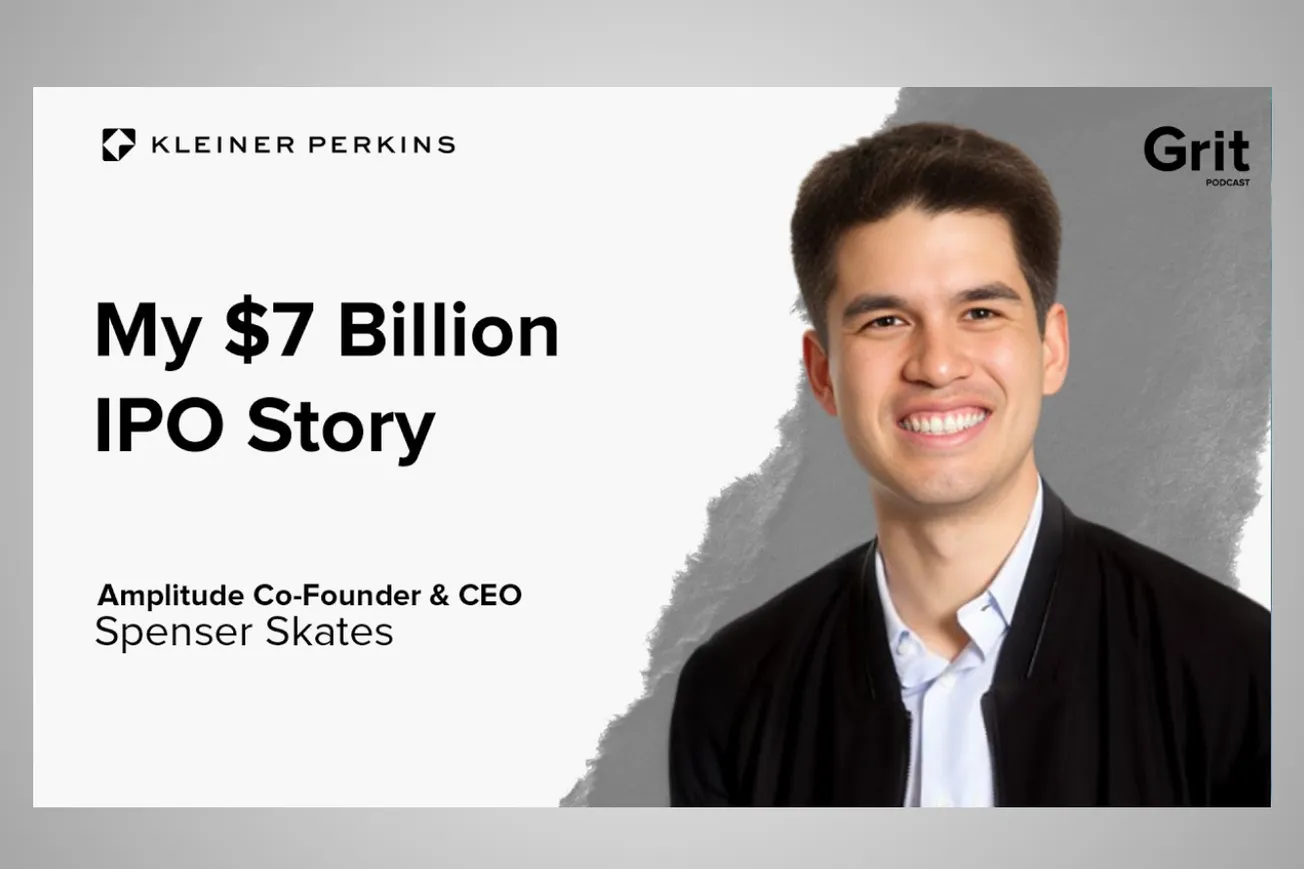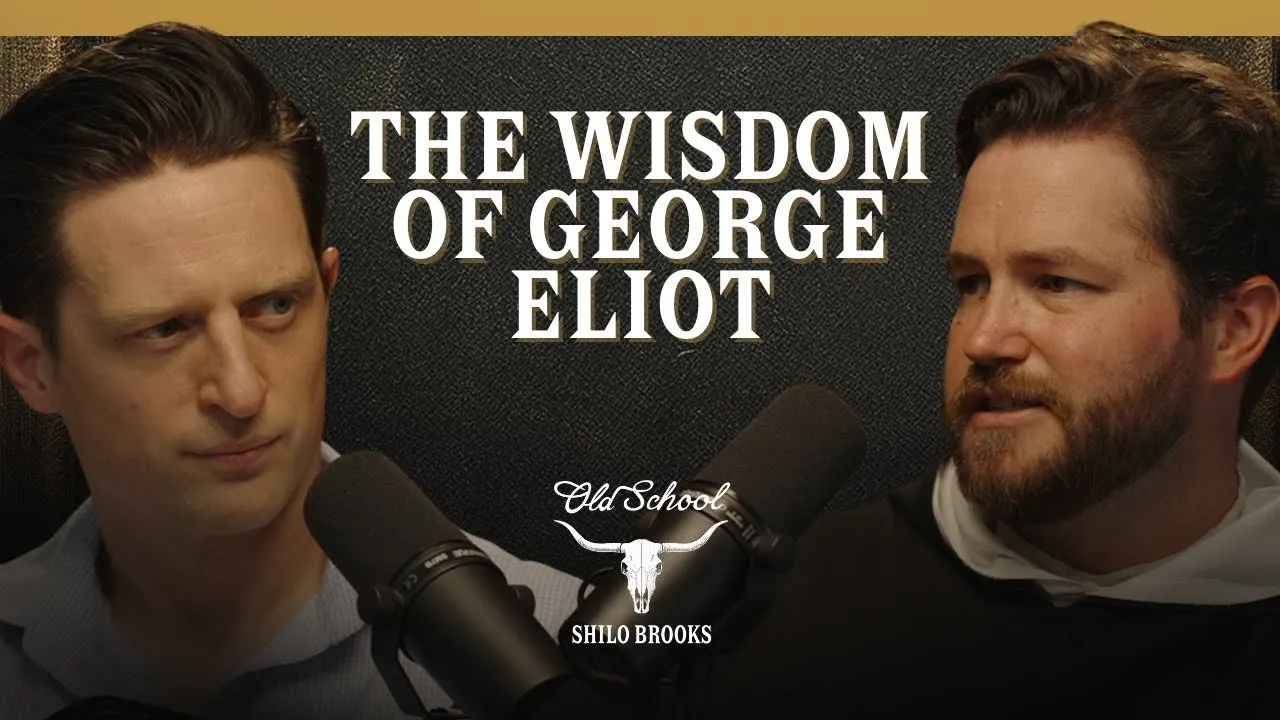Table of Contents
At 22, Spenser Skates designed the "ultimate founder" archetype: no family, no debt, no attachments, obsessive curiosity, and willingness to work for years without success. Fourteen years later, that extreme blueprint built Amplitude into a $300M analytics powerhouse—but now requires complete reinvention.
From going public at $150M revenue to navigating AI disruption as an incumbent, Skates reveals the psychological frameworks, personal sacrifices, and leadership evolution required to build category-defining companies while staying human enough to sustain decades-long missions.
Key Takeaways
- Skates created an extreme founder archetype at 22, eliminating all life constraints to maximize focus on building a successful company
- Amplitude has "trillions of data points across billions of users"—a unique dataset advantage that open-source AI models cannot replicate
- The company faces the classic incumbent dilemma: data advantages versus 13 years of architectural baggage in the AI transition
- Innovation at scale requires insulating teams from company politics and creating startup-like environments within larger organizations
- Going public early (at $150M revenue) provides price discovery and liquidity despite analyst criticism and quarterly pressure
- CEO evolution demands becoming "the person you hate"—shifting from leading by example to managing through others and making compensation decisions
- The three roles of a king (general, justice, priest) map perfectly to modern CEO responsibilities: strategy, arbitration, and inspiration
- Personal sustainability requires evolution from 95% work focus to 70%, making space for relationships while maintaining competitive intensity
- Weekly stress documentation in spreadsheets helps manage founder psychology and prevent burnout that causes 10-year departures
Timeline Overview
- 00:00–10:00 — AI Era Positioning: Amplitude's unique data advantage versus architectural challenges in the transition to AI-first analytics
- 10:00–20:00 — Innovation Insulation: Strategies for protecting breakthrough initiatives from company politics and maintaining startup velocity at scale
- 20:00–30:00 — Public Company Philosophy: Why going public early provides essential price discovery and leadership accountability despite market volatility
- 30:00–45:00 — The Ultimate Founder: Skates' extreme archetype design at 22 and the personal sacrifices required for category-defining success
- 45:00–60:00 — Leadership Evolution: Transitioning from founder to CEO through the three roles of ancient kings in modern business contexts
- 60:00–75:00 — Personal Sustainability: Moving from 95% to 70% work focus, relationship priorities, and building life structures for decades-long missions
- 75:00–90:00 — Trade-offs and Regrets: The real costs of extreme focus including friendships, health, and social connections in building billion-dollar companies
- 90:00–END — Hiring and Grit: Current opportunities in AI-native analytics and Skates' definition of grit as willingness to endure pain for something greater
The Incumbent's AI Paradox: Data Gold vs. Technical Debt
Amplitude sits at the center of a fascinating paradox that defines many successful technology companies in the AI era. After 13 years of building one of the world's most comprehensive user behavior datasets—"trillions of data points across billions of users"—the company possesses exactly the kind of proprietary information that could power breakthrough AI applications. Unlike ChatGPT or Midjourney, which rely on open-source datasets, user analytics requires access to private behavioral data that only a few companies possess.
Yet this advantage comes with an architectural burden that could prove fatal. Thirteen years of codebase evolution, customer integrations, and technical decisions made for a pre-AI world create what Skates calls "baggage" that new AI-native companies don't carry. The classic innovator's dilemma plays out in real-time: established players have assets that new entrants can't replicate, but those same assets may prevent the architectural flexibility needed for next-generation solutions.
"As the incumbent you have a data advantage. However, as the incumbent you have an architectural disadvantage because of the 13 years of baggage that you've been building."
Skates' response reveals sophisticated thinking about innovation management at scale. Rather than attempting to rebuild Amplitude's entire platform—impossible while running a $300M public company—he's creating insulated teams that operate like early-stage startups. The Command AI acquisition brought founders immersed in AI problems for years, tasked with building an agent that helps users explore and act on their data without being constrained by existing architecture.
The challenge extends beyond technology to organizational psychology. Every successful new initiative attracts attention from existing teams who want involvement in "the hot new thing." Sales, marketing, operations, and finance teams naturally want integration with breakthrough projects, but this connectivity destroys the focused intensity required for true innovation.
The Insulation Strategy: Protecting Innovation from Success
Skates has learned that breakthrough innovation within successful companies requires deliberate isolation from the very systems that create that success. When Amplitude launched its AI agent initiative, every department wanted involvement—a natural response that nearly killed the project's potential.
"Every single existing person in the company is like oh I want to be part of the hot new thing and so you have meetings with sales people and marketers and ops people and finance people and you know everyone they just want to be part of the hot new thing."
The solution involves creating startup-like environments within larger organizations through strict boundaries. Innovation teams get bi-weekly check-ins with the broader company and nothing else. No ad-hoc meetings, no integration planning sessions, no synergy discussions. The isolation allows hyperfocus on building from first principles rather than optimizing existing systems.
This approach acknowledges a brutal truth about organizational dynamics: the processes that enable efficient scaling actively prevent breakthrough innovation. The same coordination mechanisms, approval workflows, and integration requirements that allow 300-person companies to serve thousands of customers also fragment attention and dilute the obsessive focus required for category-creation.
Skates applies this philosophy to talent acquisition as well, preferring to "find founders who are working on this problem, acquire them into Amplitude, and then drive that mentality" rather than reassigning internal resources. External founders bring immersion in emerging technologies plus startup intensity that's difficult to recreate within established organizations.
The Early Public Company Gambit: Leadership Through Transparency
Amplitude's decision to go public at $150M revenue was considered premature by Silicon Valley standards, where companies increasingly defer IPOs until reaching billions in revenue. Skates' reasoning reveals contrarian thinking about leadership accountability and price discovery that challenges conventional wisdom about optimal timing.
"You cannot forget it's not their job to lead the business. It's your job as the CEO as the founder to talk about what the journey is."
His argument centers on leadership philosophy rather than financial optimization. Public markets provide continuous feedback about strategic decisions, forcing leaders to articulate vision and defend execution in ways that private markets cannot. Rather than viewing analyst criticism as harmful distraction, Skates sees it as valuable input that strengthens decision-making.
The Meta example illustrates this dynamic perfectly. Zuckerberg received pressure from public markets during the mobile transition and again during recent efficiency drives. Rather than abdicate leadership to external opinions, he used market feedback to sharpen strategic focus while maintaining control over fundamental direction.
This philosophy extends to product development, where Amplitude builds "in public" and receives constant user feedback about features, performance, and strategic direction. Building businesses in public markets merely applies the same transparency to financial performance and strategic planning.
The approach also addresses a fundamental promise of venture capital: providing liquidity for investors and employees who take equity risk. Without public markets, price discovery relies on sporadic secondary transactions or acquisition discussions that may not reflect fair value. Public trading provides continuous price signals that benefit all stakeholders.
The 22-Year-Old's Ultimate Founder Blueprint
Perhaps the most fascinating aspect of Skates' journey involves the extreme founder archetype he designed at 22, fresh out of MIT and determined to maximize his probability of building a successful company. The blueprint reads like a monastic commitment to entrepreneurial success:
- No family, debt, or external commitments outside work
- No attachment to money or lifestyle inflation
- Obsessive curiosity about every aspect of building businesses
- Willingness to work for years without success or validation
- No ego attachment to outcomes or public recognition
"Really early on, I did this exercise of what would the ultimate founder look like? And here's what I came up with, which is no other commitments outside of work."
The archetype wasn't theoretical—Skates implemented it ruthlessly for over a decade. He paid himself $30-45K annually for years while building a hundreds-of-millions revenue company, lived in minimal space, and eliminated every distraction that didn't directly contribute to Amplitude's success. When he learned that CEO pay was inversely correlated with company performance, he immediately reduced his compensation to test the causal relationship.
This extreme focus created competitive advantages that compounded over time. While peers dealt with mortgages, lifestyle obligations, and diverse interests, Skates could make decisions based purely on what would advance the business. The psychological freedom enabled risks and commitments that more constrained founders couldn't match.
The approach also filtered relationships and opportunities. Dating became impossible because "everything is career with you" even when he deliberately avoided discussing work. Only someone who valued his obsessive dedication—his now-wife Ann—could build a sustainable relationship within those constraints.
The King's Evolution: General, Justice, and Priest
Skates' most insightful framework for understanding CEO evolution draws from ancient leadership roles that remain surprisingly relevant to modern business challenges. Traditional kings served three essential functions that map perfectly to contemporary executive responsibilities:
Chief General: Leading strategy and directing resources toward competitive battles. For startup founders, this means personal involvement in every critical initiative—coding, selling, recruiting, fundraising. The founder-CEO literally leads from the front on everything that matters.
Chief Justice: Arbitrating disputes between team members and making decisions about resource allocation. Early-stage companies have fewer conflicts, but scaling organizations require constant mediation between competing priorities, personality clashes, and strategic disagreements.
Chief Priest: Inspiring belief in the mission and rallying stakeholders around shared vision. This involves communicating with investors, motivating employees, and maintaining organizational conviction during difficult periods.
"Fast forward to modern times and what the role of CEO or executive is at a company is actually quite similar. You have to say, 'Where are we going? What's the strategy?' And then you need to rally and inspire people."
The transition from startup founder to large company executive requires fundamental psychological shifts in each area. Generals must learn to manage through others rather than personally executing every task. Judges need frameworks for consistent decision-making across complex organizational dynamics. Priests must inspire hundreds rather than dozens while maintaining authentic conviction.
Skates found the justice role most challenging, particularly around compensation decisions that he initially tried to delegate. Learning that "choosing who gets paid what and what the company values is an incredibly important part of a CEO's role" required accepting responsibility for judgments about individual worth and contribution—decisions that startup founders rarely face directly.
The Psychology of Sustainable Intensity
Fourteen years after designing his ultimate founder archetype, Skates faces the challenge that causes many successful entrepreneurs to leave their companies around the 10-year mark: how to maintain competitive intensity while building sustainable life structures for decades-long missions.
His solution involves conscious evolution from 95% work focus to approximately 70%—still extraordinary by most standards, but allowing space for marriage, eventual family, and personal interests that make multi-decade commitment sustainable.
"You shouldn't just try to keep being, you know, you have to evolve into what the new thing is in order to make it sustainable and long term."
This evolution required overcoming psychological resistance to "compromise" that served him well during Amplitude's early years. The same fanatical dedication that enabled category creation could become self-destructive if maintained indefinitely without evolution.
The change also reflects practical realities of leading larger organizations. Startup founders must lead by example on everything because teams are small and every contribution matters directly. Public company CEOs gain leverage through delegation and systematic processes that don't require personal involvement in every decision.
Skates maintains competitive intensity through different mechanisms: weekly two-hour product reviews to cut through organizational complexity, systematic stress documentation to manage psychology, and continued focus on innovation as the primary driver of long-term success.
The Documentation of Founder Psychology
One of Skates' most practical innovations involves weekly stress documentation that helps manage the psychological challenges of long-term leadership. Every week for six years, he's recorded 3-7 items that stress him about the company in a spreadsheet, finding that "naming something gives you control over it."
"The biggest reasons I'll tell you about this. So one of the patterns I noticed is that even among successful companies somewhere around 10 years in the founders will leave."
The practice emerged from observing peer companies where founders departed around the 10-year mark due to frustrations with people management and organizational complexity. Rather than let stress accumulate unconsciously, systematic documentation allows conscious processing and response.
Most entries relate to people dynamics—feedback challenges, accountability issues, leadership team conflicts—rather than product or market concerns. This pattern reveals that founder departure often stems from management fatigue rather than business challenges, suggesting that better psychological frameworks could extend founder tenure.
The spreadsheet serves as an external repository for internal anxiety, creating separation between the person and the problems. Instead of carrying stress mentally throughout the week, documented issues become manageable tasks that can be addressed systematically.
The Real Trade-offs: Friendship, Health, and Social Connection
Despite Amplitude's extraordinary success, Skates openly discusses the personal costs of extreme founder dedication that extend beyond obvious sacrifices like money and lifestyle. The most meaningful trade-offs involve relationships and experiences that can't be reclaimed later.
"The one I feel the most and I regret the most, it was the right choice, but you know I did miss out on part of that part of life is just having lots of having friends and being social in your 20s."
The friendship deficit wasn't about complete isolation—Skates maintained some social connections—but about the reciprocity and investment that create deep relationships. Friends would reach out consistently while he couldn't match their investment level, creating imbalances that he still regrets despite understanding the necessity.
Health represented another area of conscious neglect during early years: poor eating, excessive soda consumption, irregular sleep, minimal exercise. Eventually he realized that health optimization actually improved work performance, making physical care align with rather than compete against business success.
The romantic relationship challenge proved more complex. Early dating attempts failed because even when he deliberately avoided discussing work, his thinking had become so business-focused that everything connected to career advancement. Only finding someone who valued rather than tolerated his obsessive dedication enabled sustainable partnership.
AI-Native Hiring and the Future of Analytics
As Amplitude navigates the AI transition, Skates' hiring priorities reflect both the technical challenges and cultural requirements of building breakthrough products within established organizations. The focus on "bleeding edge" AI talent working with large datasets acknowledges that most current approaches won't scale to Amplitude's data volumes and performance requirements.
"If you're at the bleeding edge of leveraging AI to mess around with large data sets, we want to talk to you on that. Like I want to personally talk to you on that."
The emphasis on personal CEO involvement signals recognition that AI transformation requires top leadership engagement rather than delegation to product teams. Unlike incremental feature development, architectural shifts demand founder-level attention and resource commitment.
Current opportunities span both technical roles (analog and mixed-signal engineering for chip interconnects) and product development for AI-native analytics experiences. The combination suggests that next-generation analytics requires both infrastructure innovation and application-layer breakthroughs.
The hiring philosophy also reflects lessons from the innovation insulation strategy: bringing in external talent with deep AI immersion rather than retraining existing teams. This approach recognizes that breakthrough thinking often requires cognitive frameworks developed through extended focus on emerging technologies.
Deep Strategic Analysis: The Paradox of Successful Innovation
Skates' experience illustrates a fundamental paradox facing all successful technology companies: the same capabilities that create market leadership can become barriers to next-generation innovation. Amplitude's comprehensive dataset and customer relationships represent invaluable assets, but they also create architectural constraints and stakeholder expectations that limit strategic flexibility.
This dynamic explains why technology market leadership rarely transfers between major platform shifts. PC leaders didn't dominate mobile; mobile leaders struggle with AI transitions. Success creates organizational antibodies to the radical changes required for new technological paradigms.
The insulation strategy represents one approach to managing this paradox—creating startup-like environments within larger organizations while leveraging established assets where beneficial. However, this approach requires extraordinary leadership discipline to resist the gravitational pull of coordination and optimization that naturally emerges in successful companies.
Skates' personal evolution from extreme founder to sustainable executive mirrors this organizational challenge. The same psychological frameworks that enabled category creation become limitations when building for decades-long missions. Both individual and organizational success require conscious evolution while maintaining core competitive advantages.
Essential Quotes: The Language of Extreme Dedication
"Innovation is the biggest driver of long-term growth. Amplitude's core advantage is we built a machine that can out innovate any of the competition out there." - This captures the meta-skill that transcends any individual product or market position.
"You have to become the person you hate." - The brutal honesty about leadership evolution from hands-on founder to executive who manages through others.
"If you're willing to endure pain for a long period of time in the service of something greater, that quality trumps almost anything else." - Skates' definition of grit that underlies all entrepreneurial success.
"Life is longer. There's other facets to it, and you know, it's okay to make space for other things and that makes it sustainable." - Recognition that extreme dedication must evolve to enable decades-long missions.
"The more I can be this person, the more likely it is I will build a successful company." - The conscious identity design that most entrepreneurs avoid but may be necessary for category-defining success.
Common Questions
Q: How does Amplitude maintain innovation velocity as a public company?
A: Through isolated teams that operate like startups, bi-weekly check-ins instead of constant integration, and acquiring founders with deep AI experience.
Q: Why did Skates go public early despite analyst criticism?
A: Public markets provide continuous leadership feedback and price discovery while fulfilling venture capital's implicit promise of eventual liquidity.
Q: What's the biggest challenge in transitioning from founder to CEO?
A: Learning to manage through others rather than leading by example, especially in areas like compensation and conflict resolution.
Q: How does the "ultimate founder" archetype actually work in practice?
A: Eliminating external constraints enables pure focus on business success, but requires conscious evolution to avoid burnout and enable sustainable growth.
Q: What's Amplitude's strategy for competing with AI-native analytics companies?
A: Leveraging proprietary user behavior datasets that can't be replicated while building next-generation experiences through insulated innovation teams.
Conclusion
Spenser Skates' journey from 22-year-old extremist to 36-year-old public company CEO reveals both the power and limitations of fanatical dedication in building category-defining companies. His frameworks for managing innovation at scale, evolving leadership psychology, and maintaining competitive intensity while building sustainable life structures offer rare insights into the personal and organizational challenges of long-term entrepreneurial success. The combination of analytical rigor, psychological honesty, and strategic flexibility provides a template for founders navigating the complex transition from startup disruption to incumbent innovation.
Practical Applications for Founders and Leaders
- Design conscious founder archetypes early: Eliminate life constraints that conflict with business building, but plan evolution for sustainability
- Create innovation insulation at scale: Protect breakthrough initiatives from organizational coordination through strict boundaries and bi-weekly check-ins
- Use public markets as leadership accountability: Embrace analyst feedback and price discovery as tools for strategic refinement rather than distractions
- Document stress systematically: Weekly recording of organizational challenges helps manage founder psychology and prevents unconscious accumulation
- Transition from leading by example to managing through others: Develop frameworks for compensation, conflict resolution, and strategic delegation
- Leverage proprietary datasets as AI moats: Focus on unique data advantages that open-source models cannot replicate rather than pure technology differentiation
- Maintain obsessive curiosity while building support systems: Balance extreme focus with relationships and health practices that enable decades-long missions
- Hire external expertise for paradigm shifts: Bring in founders immersed in new technologies rather than retraining existing teams for breakthrough innovation
- Apply the three roles of leadership: Strategy (general), mediation (justice), and inspiration (priest) provide frameworks for executive evolution
- Build conscious evolution rather than compromise: Planned adaptation enables sustained competitive intensity across multiple decades of company building





